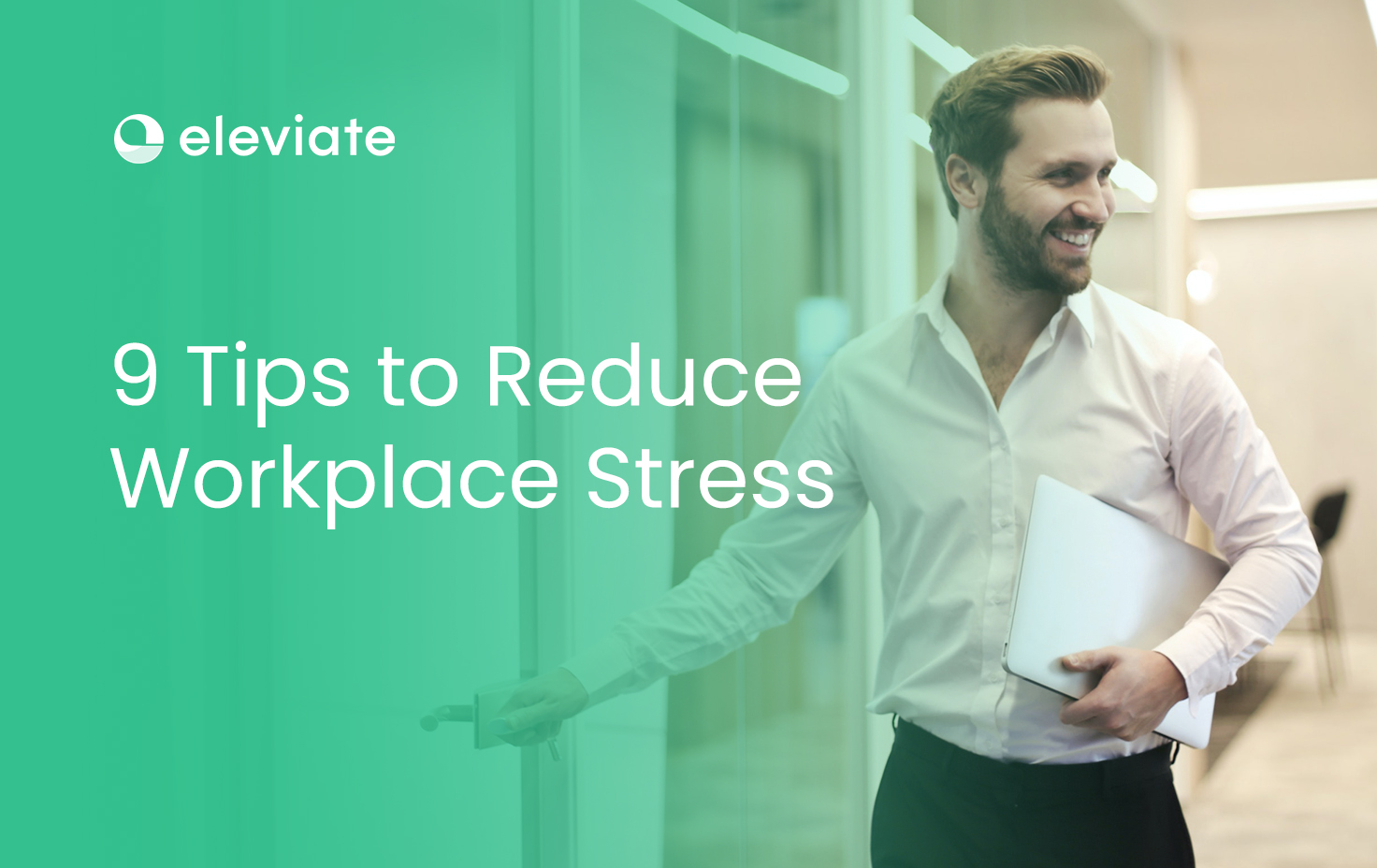Our emotional health is as fragile as our physical health, if not more. However, while your body can signal when there is something wrong with it, your mind keeps the secret for a little longer. Thus, it is essential that you recognise some critical signs of unmanaged stress, especially when it comes to friends, family members, and co-workers. Today, we will highlight the main factors that can help you reduce workplace stress and prevent all the negative effects it is usually charged with.
The notion of workplace stress explained
Before we proceed with practical advice on dealing with stress at work, you must fully understand what the notion stands for. Every work environment has an effect on the mental health of the employees. Depending on the demands, job pressure, and company culture, people involved in the process may experience excessive stress when the responsibilities exceed their capabilities. Surely, a "healthy" amount of stress is acceptable, but the line between stress and total burnout is incredibly thin.

Why should you try to reduce workplace stress?
A healthy and caring work environment usually ensures a better employee response. Thus, you get enhanced results and all the related benefits of your cooperation. Let's not forget about the moral aspect, either. The employer's primary responsibility is to care for the employee's well-being. Let's not forget about the legal part of the bargain. The fact is that work-imposed stress is legally recognised as a disability that affects workers in the long-term perspective. Thus, a considerable financial penalty may become a disadvantage you'd like to stay clear of.
Most common causes of workplace stress
Before you rush to eliminate stress in the workplace, you have to be aware of what causes it. The sooner you find patterns that lead to stress and mental health problems, the easier it will be to deal with them.
1. Workload
The workload that your employees face on a daily basis plays a huge role when it comes to stress. Thus, if you push the work volume along with the deadlines to the edge, the chances that your co-workers will fight stress are immense.
2. Control
The lack of control is the second most common stress trigger in work environments. When your employees feel like they control nothing, it stresses them out.
3. Support
Another popular stressor within the workplace is the lack of social support. When people feel like no one is supporting them, they tend to feel overwhelmed and pressured.
4. Training
The mental effects of insufficient training can't be treated lightly. If your employees lack the necessary experience in the field, it will put them under constant stress, not to mention the unsatisfactory quality of their performance.
5. Work from home
As surprising as it sounds, many people suffer from stress at work if they work from home. While you can't possibly do anything about the need for remote involvement, you should seek ways to ease the effects of working from home so that home life does not affect the employees' performance and vice versa.

Workplace stress signs to watch out for
The number of stressful situations is not limited to the options listed above, but you can still recognise the signs of stress if you know what to look for.
1. Working hours
Stress isn't always represented through physical symptoms. You may have to evaluate some behavioral patterns to detect it. Thus, if you see your employees come early, leave late, and work during the break time – they are surely struggling with the given workload. The chances that they are stressed are incredibly high.
2. Exhausted look
When stress levels are high, people tend to have sleep problems. All the sleep disturbances will affect the way the person looks. If your employees look exhausted and tired, you should start worrying about how to help them manage their stress.
3. Growing absence
Taking vacation days every now and then is on the list of healthy choices everyone should make. However, if you notice that a colleague starts to take more time off without an apparent reason, that should ring the alarm since such an approach usually signifies stress.
4. Performance decline
Work stress imposes negative consequences on employees' performance, and it is no wonder why. Should you notice that a co-worker starts to lag behind and does not perform their best, you may want to evaluate other signs and come up with a suitable anti-stress strategy.
5. Increased irritability
Job stress makes people irritable and quite angry. In case you notice that your co-workers become irritated for seemingly no reason and start behaving differently than they usually do, they may find it difficult to cope with stress and, thus, they might need help.
6. Growing sensitivity
Not all people deal with stress the same way and show signs of it differently, either. If a person does not seem to be more irritable than usual but gets overly sensitive, that is a red line to keep an eye for. For instance, should work-related jokes and conversations make them upset and guilty – your employees are stressed.
7. Decreased energy levels
Dealing with stress is exhausting on both mental and physical levels. That is why people who deal with stress at work have lower energy levels, which is noticeable.

How can employers reduce stress in the workplace?
Employee health is one of the primary responsibilities to take on the day you sign the contract. However, as you already know, physical health isn't the only part of the deal. Workplace stress will have a negative toll on the mental state of your staff. So, the moment you recognize the first signs of stress in the environment, you should figure out steps to take to decrease or eliminate workplace stress. Let's discuss some powerful ways to cope with work-related stress successfully, shall we?
#1 Start with a healthy work-life balance
Some people take their careers more seriously than others, and there is little you can do to change that. However, it has already been proven that work-related stress usually follows employees home. When that happens, people fail to relax, unwind, and recharge, so the endless stress cycle begins. The best thing you can do to cope with the issue would be to allow employees to maintain a healthy balance. What does that include? You shouldn't interfere with your colleagues' off-work time and send no emails or calls during their home time. Another way to help co-workers manage stress is to monitor the workload and deadlines you impose. You must ensure that your workers have more than enough time to deal with every pre-set task.
#2 Consider improving the benefit system
When you choose to reduce work stress, you must realise that the best way to succeed with the task is to take care of your employees' well-being. It means that you have to take care of them in every way possible. Some organisations consider improving their health insurance policies, retirement benefits, maternity leaves, disability benefits, and more. If you don't know where to start, you should reach out to a professional employer organisation. Organisations like that offer various benefit packages that you can choose from and implement into the work process.
#3 Encourage open communication
Very often, lower-rank employees feel intimidated by managers and directors. When a person constantly lives in fear of speaking up to a manager, the stress level will slowly build up until it reaches its peak. No matter the safety net of benefits you offer, it may not save the situation. To avoid such a stressful situation, you should book professional staff courses where they show the top-rank workers how to work in sync with lower-rank employees without suppressing and stressing them. When you make it clear that boss-employee communication can and should be open and every bit of criticism is constructively delivered, you will see how the stress levels go down.
#4 Implement meditation classes
Most stress comes from constant pressure and the inability to relax. That is why introducing a happy hour into the workflow is one of the safest ways to decrease the stress level within the workforce ranks. Some companies hire a trained meditation coach who comes to the office and helps the employees improve their states of mind and unwind. If you currently can't afford to invite a specialist, you can work with apps like Eleviate. Such applications offer all the things you need, including meditation exercises, professional support, and theoretical background.
#5 Improve the paid vacation policy
The best way to reduce stress within the work environment is to provide your co-workers with enough time to relax and unwind. While most companies may not restrict the number of vacations a worker can take throughout the year, not all of them are paid for.
Such an approach makes an employee feel guilty and stressed about spending time off work without making any money in the process. All that leads to the workforce sticking to the office routine no matter how tired they feel. If you introduce better-paid vacation conditions, you will show your workers that you care for them. In the long run, a well-rested employee is always better than a few exhausted ones.
#6 Work on flexible work schedules
The personal life of your staff should not affect the workflow, but you may want to make a few exceptions to stimulate the colleagues. For instance, if your employees have kids or elderly parents who require constant attention, you can implement a flexible work schedule into the routine. Thus, it will be easier for the person in question to restore that balance that may have compromised their effectiveness. While your staff is allowed to care for those they love without it negatively affecting their career, they will feel less stressed and more valued. There are too few tasks that can't be carried out from the safety of one's home, at least partially, and you should use that.
#7 Consider one-on-one meetings
If you have a large team of workers to observe, you can miss out on some critical factors that indicate the growing stress level of a given individual. That is why industry experts suggest that you schedule regular one-on-ones with your staff. You don't have to plan a lengthy session. If the stress is there, you will notice it immediately and be able to come up with an effective solution.
#8 Plan regular team outings
Very often, your employees have few opportunities to get to know one another better due to their individual lifestyles and interests. However, being on the same page with one another is critical if you want to eliminate workplace tension. That is why scheduling team outings is a great way to help your workforce interact with each other on a more personal level. There are countless stimulating activities you can take on as a group, starting with a lunch out at the local restaurant and ending with a hiking trip. Yet, it is critical that you know the individual interests and preferences of the staff well. For instance, it would be inappropriate to take a vegetarian to a grilled meat lounge.
#9 Create a fun work environment
You can kill two birds with one stone if you work in a fun environment like the office. What does it mean? You can encourage your staff to take more breaks throughout the day if there are some fun activities to take on. Instead of smoking cigarettes during the break, your employees can play ping-pong or take a video game session. Some companies encourage their workers to bring kids or pets to work on some days. Such an approach will improve office morale and general team productivity, not to mention the fact that it will help you manage stress within the workforce.
Reduce stress with the Eleviate app
Employee stress is usually one of the most underrated issues in the working environment. If you care about your workers and want to improve their quality of life, but have no idea where to start, try our new Eleviate app. The application will provide you with the necessary information on your staff’s state of mind. On top of that, practical meditation and dynamic workouts will bring you a few steps closer to stress-free work conditions. Lastly, our growing community of mental health specialists offers one-on-one sessions should the need arise. Download the Eleviate app today and watch your life turn for the better instantly!





